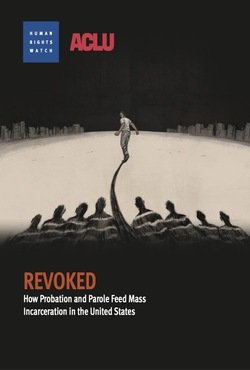Revoked: How Probation and Parole Feed Mass Incarceration in the United States
By Allison Frankel
Probation and parole in the United States are promoted as alternatives to incarceration that help people get back on their feet. But in reality, arbitrary and overly harsh supervision regimes are driving high numbers of people into jail and prison—feeding mass incarceration. Given generations of structural racism, Black and brown people are disproportionately subjected to supervision and incarcerated for violations. Based on 164 interviews and new data analysis, this joint report by Human Rights Watch and the American Civil Liberties Union (ACLU) documents the tripwires that lead people from supervision to incarceration in three US states where the problem is particularly acute: Pennsylvania, Wisconsin, and Georgia. Revoked: How Probation and Parole Feed Mass Incarceration in the United States finds that supervision systems in the three states impose wide-ranging and unnecessarily onerous conditions, and in large part fail to connect people with the resources they need to comply. As a result, many people wind up incarcerated for violations involving drug use, failing to report address changes, and public order offenses like disorderly conduct. At root, these violations often stem from poverty and a lack of support to address underlying health, housing, or other problems. Incarceration is a grossly disproportionate response, and further upends their lives. Human Rights Watch and the ACLU urge governments to divest from supervision and incarceration and invest in jobs, housing, and health care. The report also provides detailed recommendations authorities should follow to substantially reduce the use of supervision and limit incarceration for violations.
New York: Human Rights Watch and American Civil Liberties Union, 2020. 231p.


